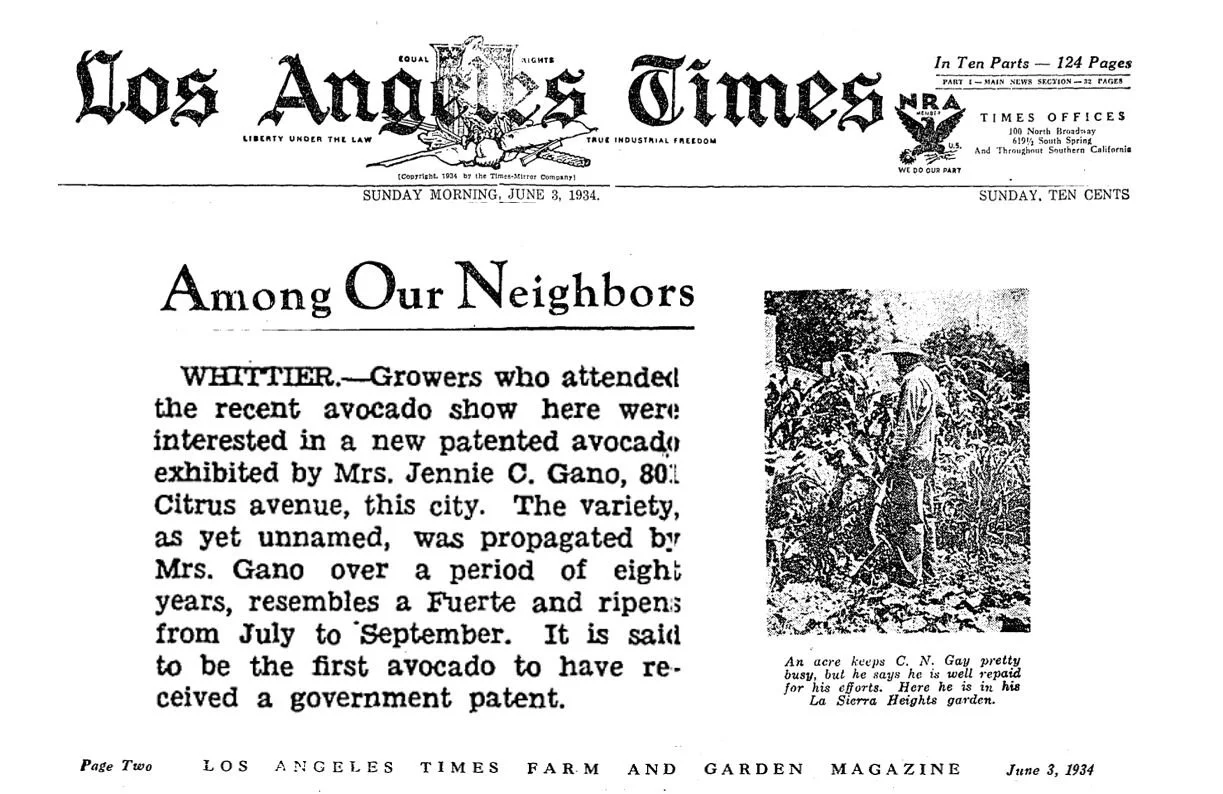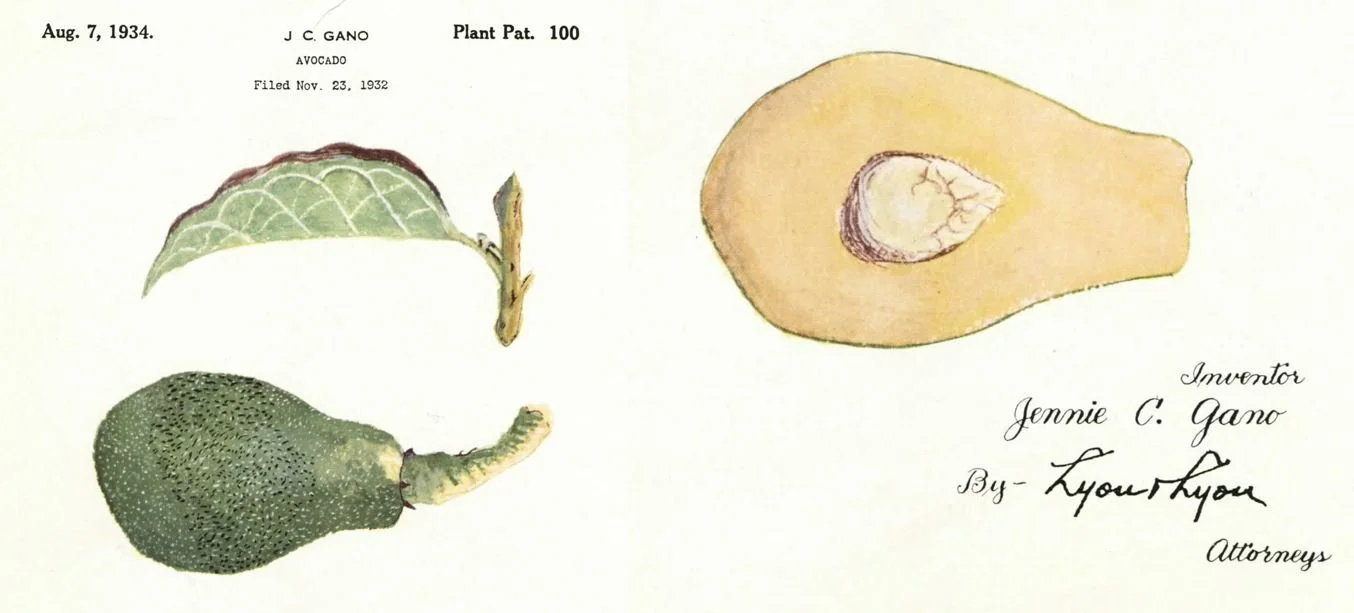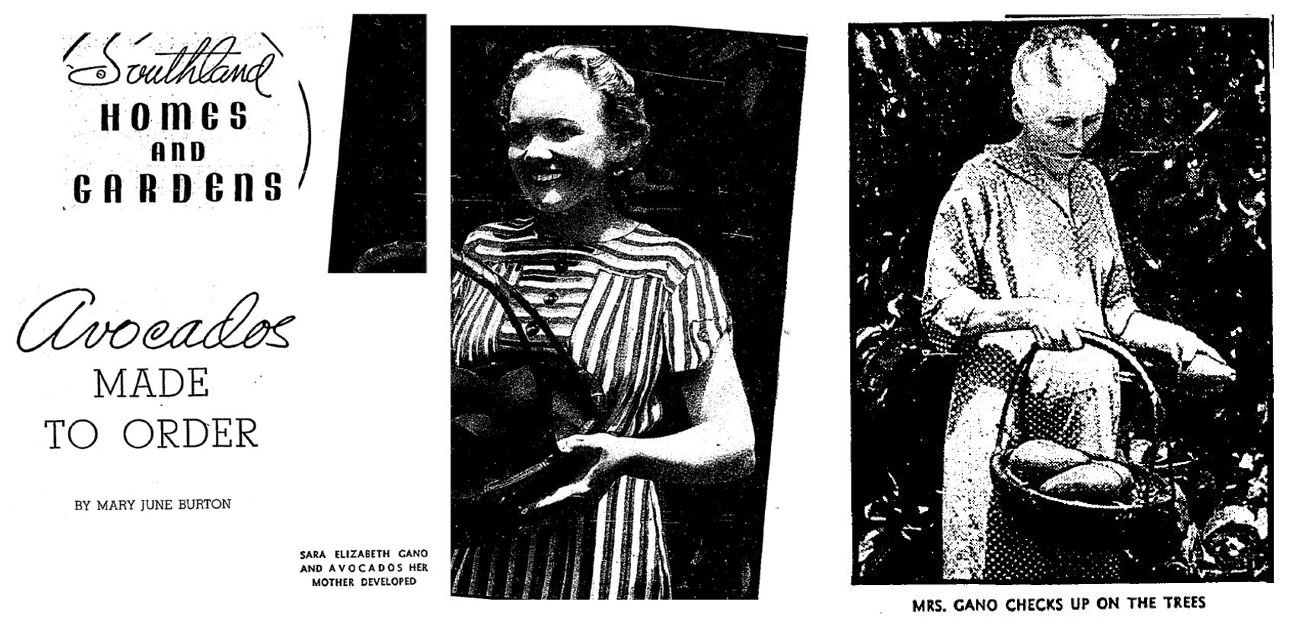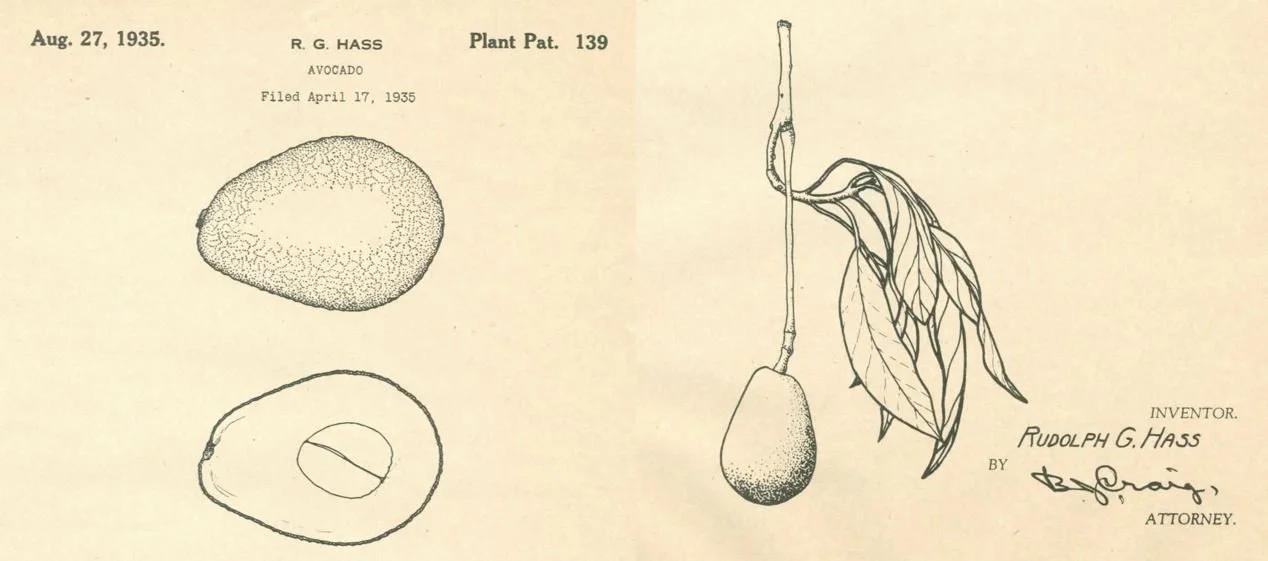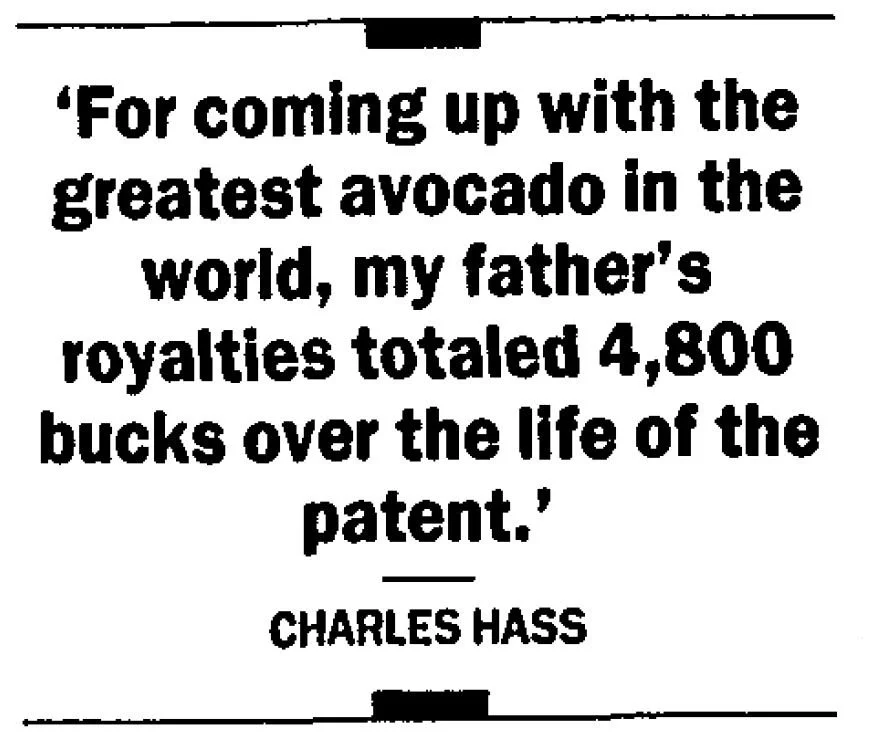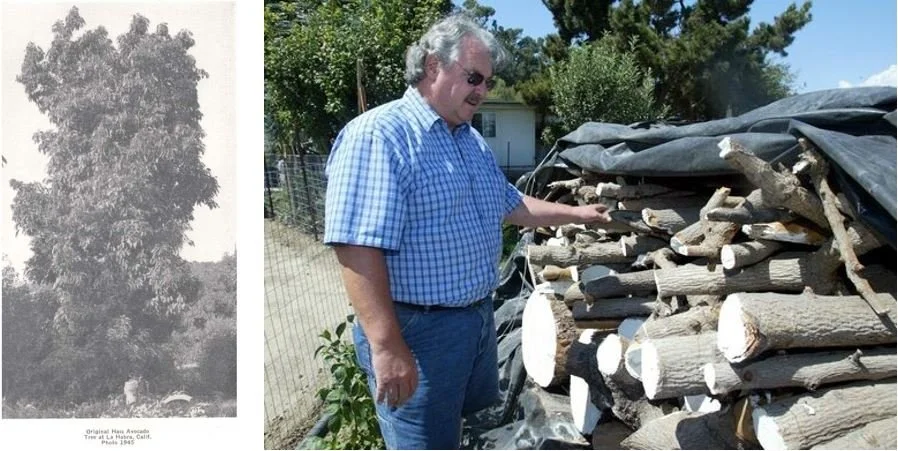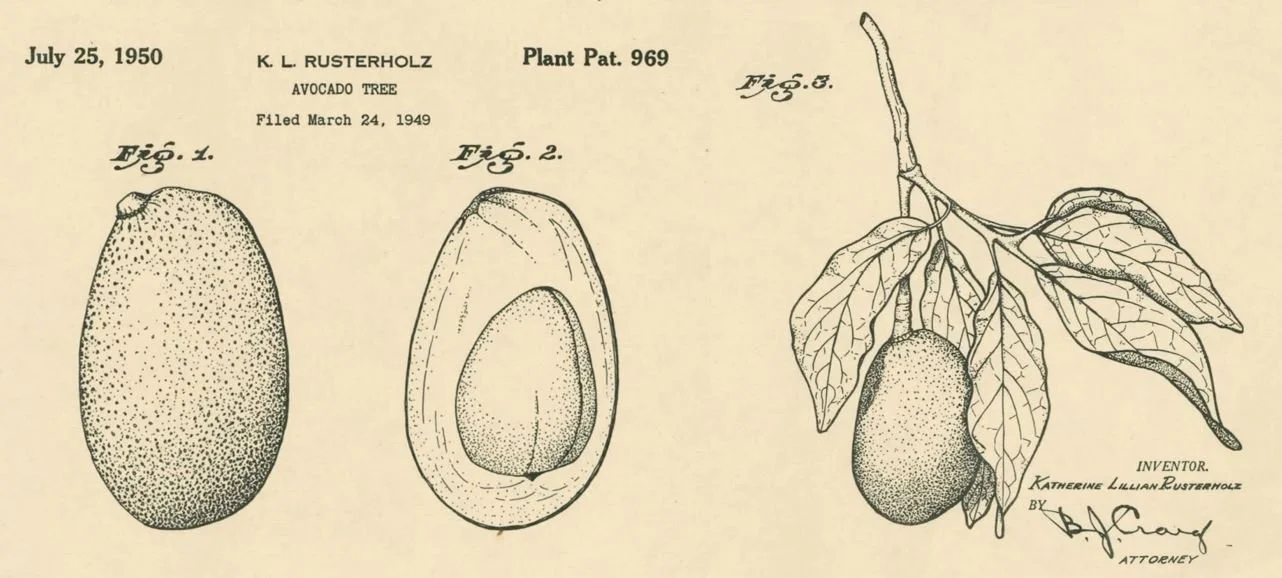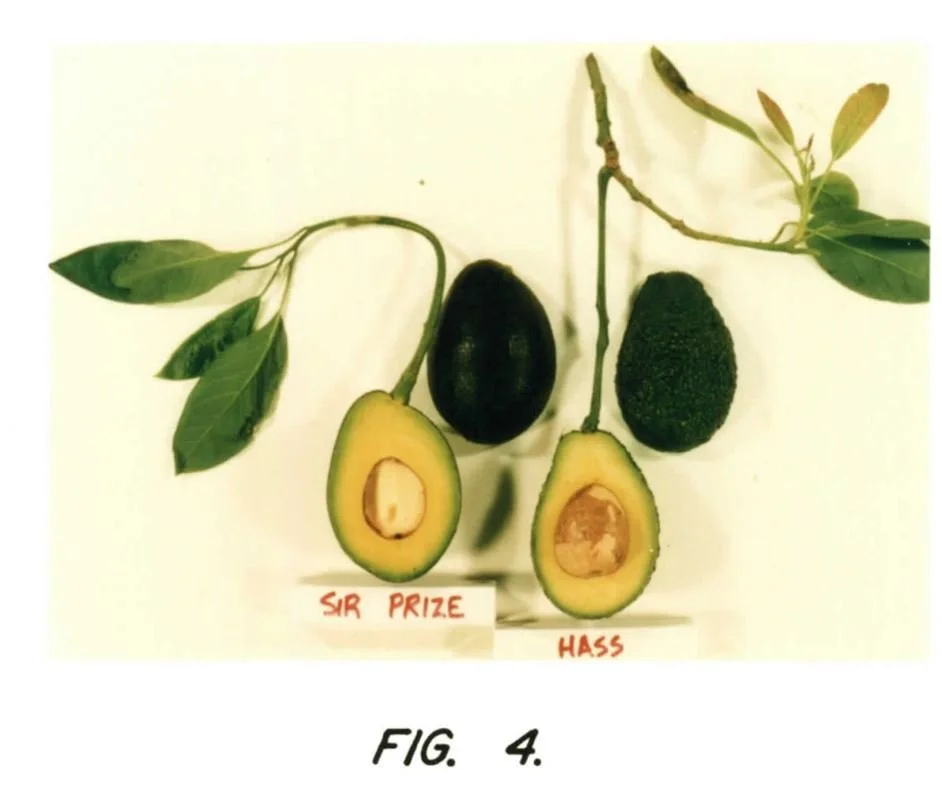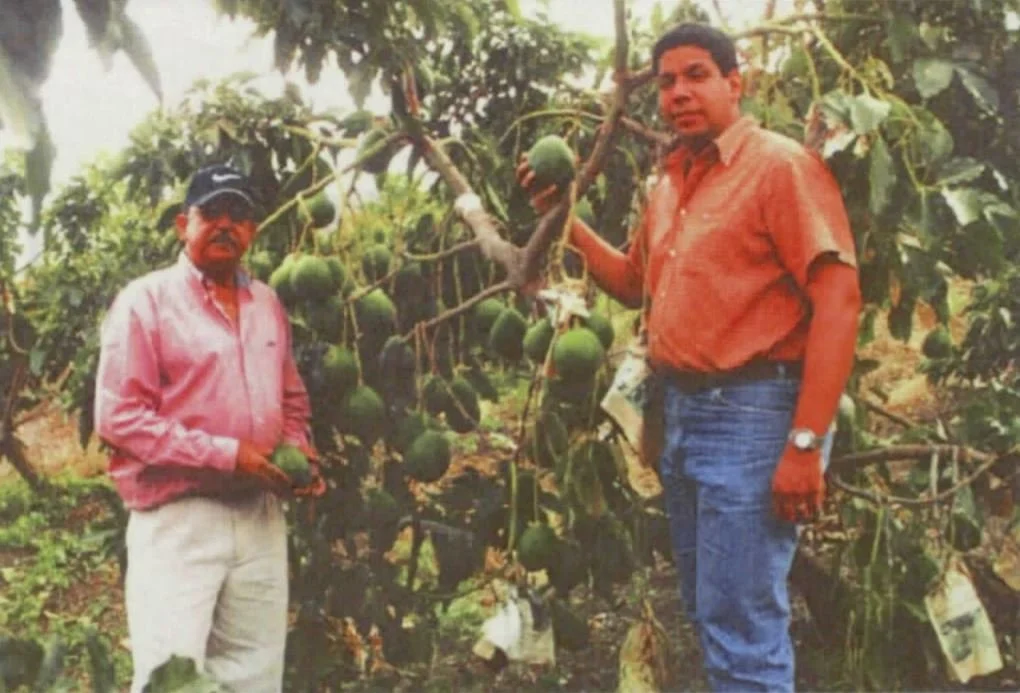Avocado Plant Patents
This post is the expanded version of a Twitter thread on the history of avocado plant patents (2021-07-08).
The most famous avocado variety is “Hass” (US Plant Patent No. 139); indeed, many think it was the first plant patent for an avocado tree. But this is not true.
The First Avocado Plant Patent
Figure 1 - Extract from the Los Angeles Times (Sunday 3 June 1934) about Gano’s avocado variety, recounting that “it is said to be the first avocado to have received a government patent.”
The first patent for an avocado (US Plant Patent No. 100) was awarded to Mrs Jennie C. Gano on August 7, 1934—a year before the Hass patent. Newspaper articles about the former seamstress from Indiana described how she “found success with a little ranch and five dollars.”
Mrs Gano’s avocado had “glossy dark green” skin that sometimes turned purple. Her trees took 2 years to mature and bore fruit in summer, compared to existing varieties like Fuerte that took 3-4 years to mature and bore fruit in the winter.
“Her patent avocado, Mrs Gano says modestly, was the result of a lucky accident and her own penchant for experimenting. “One year the fumigator knocked the top out of one of my Colorado trees,” she explains. “Three avocados were knocked off so I planted their seeds. All three grew and fruited out, but no two bore fruit alike; so I picked one of the three as especially promising and developed it into my patent avocado. It is a cross between the Fuerte and the Colorado, cross-pollenized by a bee.””
Figure 2 - Images from Plant Patent No. 100 (“Gano avocado”)
In 1917, Gano was lugging a suitcase full of avocados to Los Angeles markets and hotels because wholesalers wouldn’t handle the new fruit. Twenty years later, she had 350 trees, a plant patent and a growing reputation. She received calls from England, South America, the Philippines – even calls from a vegetable oil company in Australia asking her to come to the Antipodes to experiment with growing avocados there!
Figure 3 - Photos of Mrs Gano (right) and her daughter, Sara (left) with the Gano avocado variety. From the LA Times (Aug 30, 1936) p. 19.
The LA Times reported in 1936: “Her customers persist in calling it the Gano avocado, but she protests vigorously. “There are too many named for people now,” she says. “I’d rather just call it No. 100—because it was the hundredth plant patent issued altogether under the new law.””
Hass Avocado
Meanwhile, the Hass (often misspelt “Haas”) avocado plant patent was granted in August 1935 to Rudolph Hass, a US postal worker. The original tree was planted on the Hass family property in 1926, one of several Guatemalan seedlings purchased by Rudolph Hass with a loan from his sister. Avocados (genus Persea) are native to Mexico, Central America and the West Indies.
One seedling refused to accept a graft, so Hass ignored that tree. It didn’t help that the tree bore fruit with rough, purple-black skin. Back then, Fuerte was the most popular variety, which had smooth green skin (just like Mrs Gano’s avocado). Consumers saw purple-black skin as a sign of poor-quality fruit.
Rudolph Hass planned to uproot the recalcitrant tree. But then, either his friends or children (the stories differ) ate the fruit—they loved its creamy and non-fibrous flesh—and convinced him to keep the tree.
Figure 4 - Rudolph Hass with his wife in front of the Hass mother tree
Once he successfully grafted the tree onto a Mexican seedling as rootstock, Hass obtained a plant patent for the avocado. He made a deal with the local Brokaw Nursery to grow and promote the variety, from which Hass received a 25% royalty on the sales.
Figure 5 - Images from Plant Patent No. 139 (”Hass avocado”)
But with the “ugly” skin, the Hass variety was a tough sell. It wasn’t til the 1970s that Hass overtook other varieties and became the most prominent avocado as we know it today. Rudolph Hass did not live to see that popularity; he died in 1952.
Figure 6 - Plaque commemorating the Original Hass Avocado Tree in La Habra Heights, California, USA.
Figure 7 - Quote from Charles Hass in the LA Times (March 29, 1992)
He did not earn much from the patent. Some believe this was because the law didn’t prevent other growers from grafting Hass trees onto other trees – but that is certainly plant patent infringement. More likely, the patent had simply expired by the time sales boomed.
The original Hass avocado “Mother Tree,” planted in 1926, had a very long life and grew 65 feet tall. In 2002, the tree succumbed to root rot (a very common problem for avocado). Once chopped down, the wood from the tree was preserved by Brokaw Nursery – the original licensee.
Other Avocado Patents
In 1960, the New York Times reported that the second ever plant patent for an avocado was awarded to a James S. Reed. This was completely incorrect: US Plant Patent 1,967 was the 18th avocado plant patent. The article had overlooked patents such as:
“Rusterholz” (US Plant Patent 969, granted July 25, 1950), invented by Katherine Rusterholz
“Kimball” (US Plant Patent 1,438, granted December 20, 1955), invented by Ingegerd Isakson, which she assigned to Arthur S. Kimball and Weldon C. Wilkins.
Figure - Images from Rusterholz avocado patent (PP 969)
Lots of plant patents have been awarded for avocado varieties, but Hass continues to dominate commercial production. Even this patented variety is a “grandchild” of the Hass plant: “Sir Prize” (US Plant Patent 9,709) .
But with the surging popularity of avocado in the last decade, breeders have experimented with new varieties.
giant avocados
One recent trend was giant avocados, like the one sold in Australia under the trade mark “Avozilla” (No. 1,632,344, registered from July 3, 2014). The “Avozilla” was a smash hit in Australia when it launched in 2018. It was grown in Queensland under a licence from the South African owners.
In the US and the UK, a giant avocado was launched much earlier: “Carla” (US Plant Patent 16,594, granted May 30, 2006). About 5 times the size of a Hass avocado, this variety was developed in the Dominican Republic. The patent document includes this fabulous photo of a fruit-laden 4 year old Carla tree with the inventor, Carlos Castillo Pimentel (left), and his son, Karel Castillo (right), “for scale reference.”
By 2018, the company was producing 4.5 million Carla avocados a year. In September 2018, the owner of the Carla avocado, Agroindustria Ocoeña (AIOSA), commenced patent infringement proceedings in Florida against a Californian company, Fresh Directions. AIOSA had detected sales of clones of the Carla plant, albeit under a different name – the trademark “AVOPRO” (No. 2,371,720, registered July 25, 2000)
To help prove infringement, AIOSA’s lawyers even did DNA tests to confirm that the avocados were clones (and ate lots of guacamole…). In their reply in October 2018, Fresh Directions didn’t dispute that they were selling Carla avocado clones. But they argued that the Carla plant patent wasn’t valid, amongst other defenses (without much detail).
Then things got awkward… The inventor (who had passed away) had given his brother—Manuel Castillo Pimentel—permission to use buds and clippings from the Carla avocado tree. Where was this brother now? He owned a company: Fresh Directions.
“AIOSA was not aware of Fresh Directions’ implied rights to the patent and would not have brought suit had it known,” their lawyer told the Miami Herald in June 2019. “AIOSA apologises for any inconvenience the litigation may have caused.”
